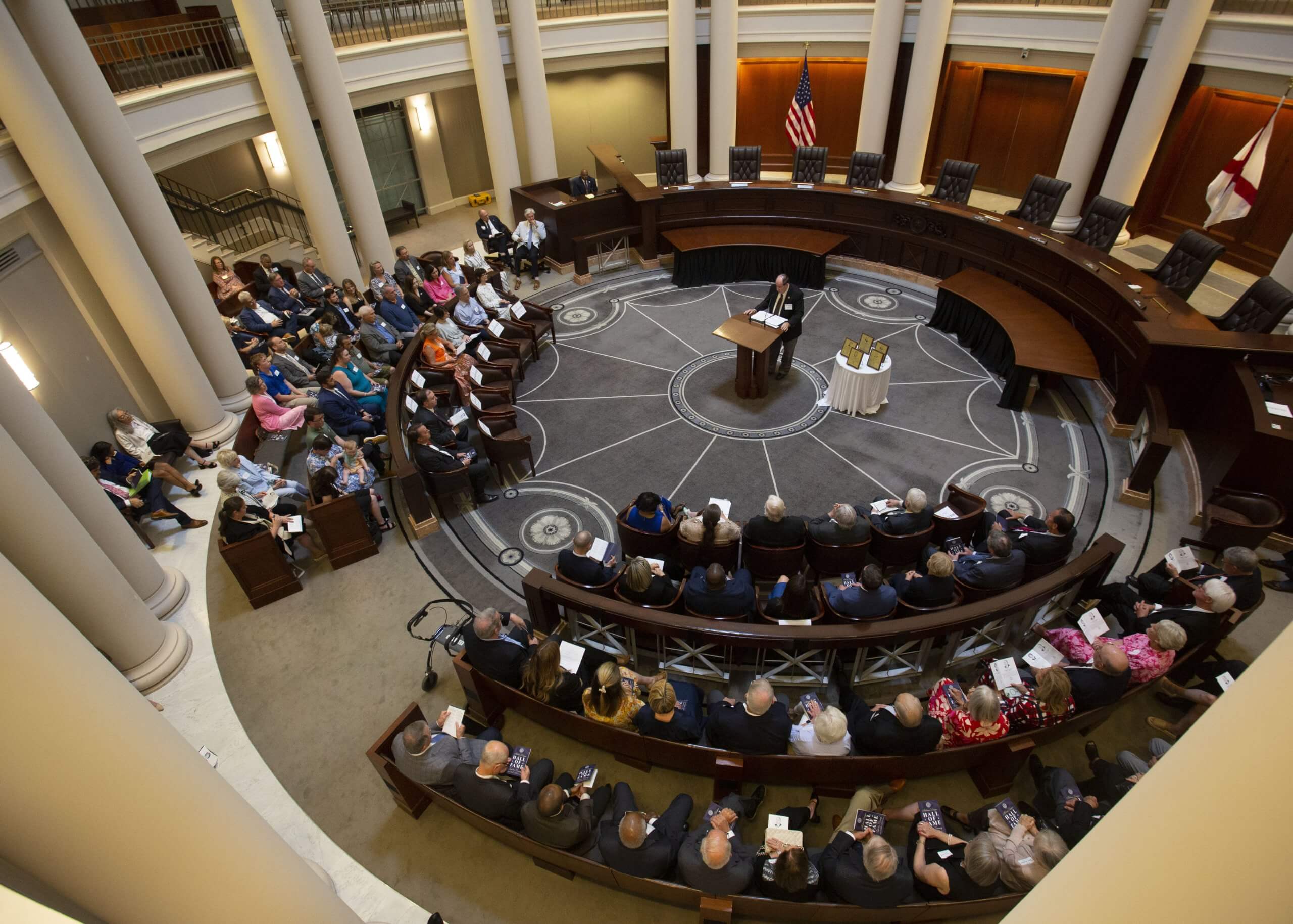
To view or download photos from the May 2, 2025 Induction Ceremony, click here. If you experience any difficulty with your photo downloads, email us here, and we will assist you!
The year 2025 featured the 21st induction ceremony for the Alabama Lawyers’ Hall of Fame. With our 5 new members, we will have honored exactly 100 lawyers in the ranks of distinguished Alabama attorneys. This is a tremendous milestone. In our first 5 years, we inducted 4 new members each year. But, due to the significant response of outstanding nominations, the number of new inductees was increased to 5 each year. Each nominee must have been deceased for a minimum of two years at the time of their nomination, and at least 1 inductee must have been deceased for a minimum of 100 years. This allows recognition for contemporary or semi-contemporary lawyers while also saving a place for recognizing the pioneering lawyers who built our profession but may not be as well-known as more recent attorneys. So, consider this — among all the lawyers of Alabama, in the more than 200 years of its existence, these 100 honorees are the outstanding representative exemplars of our legal profession. Their stories are truly impressive.
Our honorees have been nominated because they distinguished themselves in their law careers. They have demonstrated this through various examples of achievement, leadership, service, mentorship, political courage, or professional success. Here are representative standards for their selection:
- A record of extraordinary skill in the profession of the law and service to the Bar
- Status as an Alabama lawyer who made extraordinary contributions through the law at the state, national, or international level
- A breadth of achievement rather than a single achievement
- A profound respect for professional ethics
- A leadership role in advancing the interests of their community
- A recognized ability to mentor, lead, or inspire others in pursuing justice
- A lifetime of service
Over the years we have recognized men and women, black and white attorneys, members of the Supreme Court of the United States and the Supreme Court of Alabama, other judges, both appellate and trial, both Federal and State, military heroes, public servants, law professors, a Clerk of the Alabama Supreme Court and Reporter of Decisions, Assistant U. S. Attorneys, Governors, Senators, Congressmen, Mayors, City Councilors, an Ambassador, Speakers of the Alabama legislature, a Speaker of the United States House of Representatives, and a Vice-President of the United States. But our largest single demographic is the group of lawyers, all outstanding individuals, who have labored in the field of private practice. All of our lawyer-inductees are the true giants, the mentors, and, yes, the heroes of our profession. Their plaques are located in the lower rotunda of the Heflin-Torbert Judicial Building, and together they form a very impressive collection.
A twelve-person panel serves as the Selection Committee for the Hall of Fame. The twelve members are:
- The Director of the Alabama Department of Archives and History
- Four persons named by the Board of Bar Commissioners for a term of three years
- The Immediate Past President of the Alabama State Bar
- The Executive Secretary of the Alabama State Bar or his/her designate
- One person nominated by the Chief Justice of the Alabama Supreme Court.
- One person nominated by each of the three presiding Judges of the Federal District Courts of Alabama for a term of three years
- A representative of the Alabama Bench and Bar Historical Society
Here are the new inductees to the Alabama Lawyers’ Hall of Fame. We hope that all of their stories and achievements will serve to inspire the present and future citizens of Alabama.
Samuel A. Rumore, Jr. – Chair, Alabama Lawyers’ Hall of Fame Selection Committee
- Camille Cook (1924-2018)
-
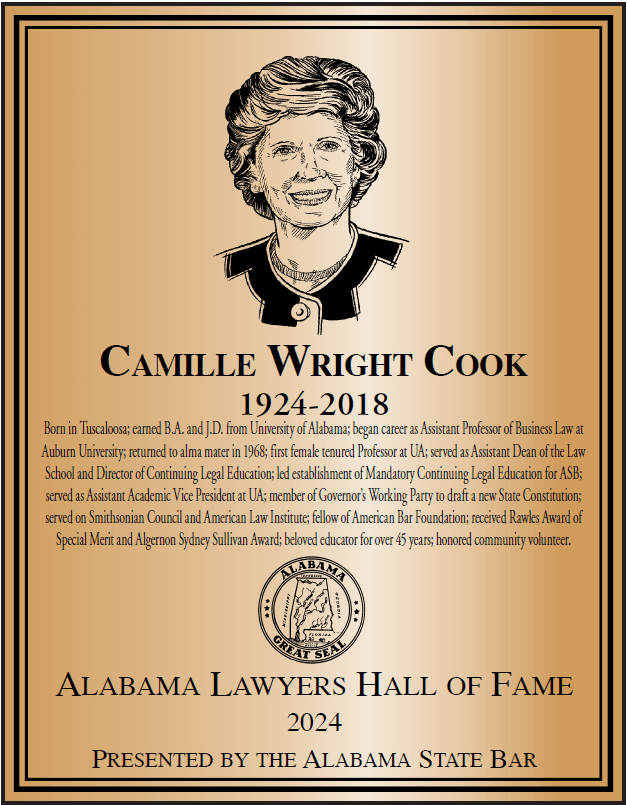
Camille Wright Cook was born April 14, 1924 in Tuscaloosa, Alabama. She died there on February 20, 2018. She was the daughter of Circuit Judge Reuben H. Wright and Camille Searcy Wright. And she was the sister of U.S. Bankruptcy Judge George S. Wright.
Camille Cook was a beloved legal educator for over forty-five years, as well as a widely recognized and honored community volunteer. With regard to her volunteer service, she said, “I just thought I needed to help.” At her selection, as a Pillar of West Alabama in 2009 she expressed her strong belief that, “Town and Gown” should work together. She considered it a privilege to serve both and she did so throughout her life.
Professor Cook earned both her B.A. and J.D. degrees from the University of Alabama. She graduated with the UA’s legendary law class of 1948, and began her career as an Assistant Professor of Business Law at Auburn University where she taught for twenty years. She returned to her alma mater in 1968, where she established an impressive record of service to legal education, the legal profession and the Bar for twenty-five years. From her appointment as Administrative Assistant to the Dean she would become a lecturer in law and ultimately the first female tenured Professor at the University of Alabama School of Law. She was the first woman to receive an endowed professorship at the University of Alabama. She also served as an Assistant Dean of the Law School and was the Director of Continuing Legal Education. She led in the establishment of the Mandatory Continuing Legal Education requirement for members of the Alabama State Bar. Professor Cook’s areas of academic interest included Family Law, Women and the Law, Children’s Rights, Contracts and Sex Discrimination. Over the years of her service, she authored or co-authored numerous publications and coordinated the publication of many handbooks and studies offered by the Alabama Bar Institute for Continuing Legal Education.
Professor Cook served in the University of Alabama Administration for two years as the Assistant Academic Vice President. This was just one of the many areas of her service to the Law School, the broader University, the Alabama State Bar and the hundreds of lawyers she mentored, challenged and encouraged. She inspired many men and women to follow her selfless contributions to the noble profession of the law.
Beyond academia, professor Cook served the State of Alabama as a member of the Alabama Air Pollution Commission and the Governor’s Working Party to draft a new State Constitution. She served on the Smithsonian Council of the Smithsonian Institution in Washington, DC, and the American Law Institute. She was a Fellow of the American Bar Foundation, and received the Rawles Award of Special Merit from the American Law Institute and the American Bar Association.
She was recognized throughout her career with numerous awards including the University’s highest, the Algernon Sydney Sullivan Award, an Outstanding Commitment to Teaching Award from the UA National Alumni Association, the Alabama State Bar Award of Merit, and several Outstanding Alumnus Awards including the University of Alabama’s Distinguished Alumni Award in 1996.
In the Tuscaloosa community, her wise counsel and hard work benefited many organizations, including the American Red Cross, the Girl Scouts, the University Club, the Hospice of West Alabama, the Druid City Hospital Cancer Treatment Center, the West Alabama Heath Council, the Tuscaloosa Children’s Center, the AmSouth Bank Board of Directors and the Vestry of Christ Episcopal Church in Tuscaloosa.
Honored time and again in law, academia and her community, Camille Wright Cook, with grace and humility, provided an exemplary and selfless record of contributions to the legal profession and the practice of law. She was a shining example of what a lawyer could be and she was admired and respected for her dedication to the law. Professor Cook felt her greatest achievement was her family. Two of her three sons are members of the Alabama State Bar as is her son-in-law.
Camille Wright Cook was a shining example of the type of lawyer who should be recognized by induction into the Alabama Lawyers Hall of Fame. The lawyers of Alabama are proud to honor her with this selection.
- James O. Haley (1912-2002)
-
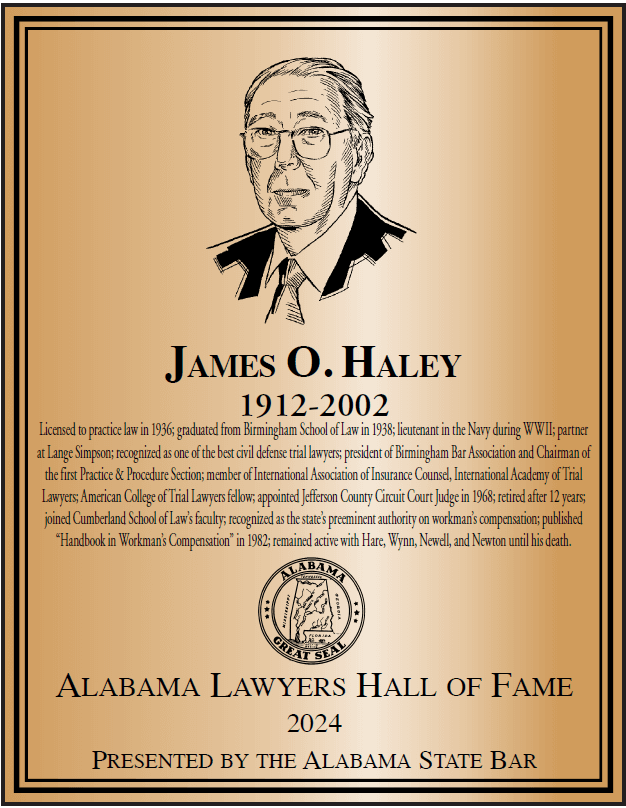
Though always an Alabama lawyer, James O. Haley was born in Copiah County, Mississippi on June 17, 1912. His family moved to Jefferson County, Alabama when James was a child and he attended Barrett School in the East Lake section of Birmingham. James graduated from Woodlawn High School in Birmingham. Despite the country suffering in the depths of the great economic Depression at this time, he attended college for one and a half (1 ½) years at Howard College, which at that time was located in the East Lake area of Birmingham. After he left school, he went to work as a receptionist at the law firm of Lange Simpson. He was promoted to file clerk. Because of his work experience and diligence at the Lange Simpson law firm, James was allowed to enroll at the Birmingham School of Law despite only having one and half (1 ½) years of college.
After only one and a half (1 ½) years in law school, Haley sat for the Alabama State Bar exam, and passed, becoming licensed to practice law in April of 1936. He was promoted to the position of Mr. Simpson’s secretary, where he remained until he graduated from law school in 1938. He gave the class oration at the graduation ceremonies. That same year, he married Mildred Ellis, a clerk in the Circuit Clerk’s office.
Jim Haley served as a lieutenant in the Navy during World War II and was a gunnery officer from 1944 to 1946. After the War he returned to Lange Simpson and would later become a partner. During his many years there, he was recognized as one of the finest civil defense trial lawyers in Alabama. He became President of the Birmingham Bar Association in 1963. He served as Chairman of the first Practice & Procedure Section of the Alabama State Bar. He was a member of the International Association of Insurance Counsel, International Academy of Trial Lawyers and a fellow in the American College of Trial Lawyers. Frequently in the courtroom, Haley would chew on a big fat cigar, conveying to the jurors he was “nothing but a country lawyer.”
After 32 years with Lange Simpson, Haley began more than a decade of public service when Governor Albert Brewer appointed him to the Jefferson County Circuit Court Bench in 1968. Renowned as a fair and courteous Judge, he was also considered to be exceptionally well versed in the law, being given the very first Alabama Bar Association Award of Merit, designating him as the state or federal judge who contributed the most to the administration of justice in the state of Alabama.
After 12 years as a judge, Haley retired from the Bench. In 1980 he became a member of the Cumberland School of Law’s faculty and also became associated with the Plaintiff’s firm of Hare Wynn Newell and Newton. Cumberland hired him to raise their trial practice program to the next level where its participants could compete on a national scale. It did not take long. In 1981, his team won the national championship. They won again in 1984 and 1987. In 1991, he won the Jacobson Award for Excellence in Teaching Trial Advocacy from the Roscoe Pound Foundation.
At Cumberland, Haley also taught civil procedure and workman’s compensation. He was recognized as the state’s preeminent authority on workman’s compensation and his “Handbook in Workman’s Compensation” was first published in 1982. Haley also developed Cumberland’s Center for Advocacy and Clinical Education which continues to be a living testament to his lifetime of accomplishments.
James O. Haley was an Alabama lawyer for 66 years. He died in Birmingham, Alabama on May 2, 2002. He was active at his law firm until he died at age 89. He earned his accolades through hard work and an unyielding, honest, commitment to his vocation. He excelled in all aspects of the profession — defense lawyer, plaintiff’s lawyer, judge, author and teacher. He constantly reminded his students and other lawyers that regardless of what type of practice they may pursue, that we are all members of a noble profession and that the torch has been passed to us, and we are admonished to keep it burning with dignity, respect and honor. The lawyers of Alabama pay respect to and honor Judge James O. Haley with induction into its Alabama Lawyers Hall of Fame.
- George Washington Lane (1806-1863)
-
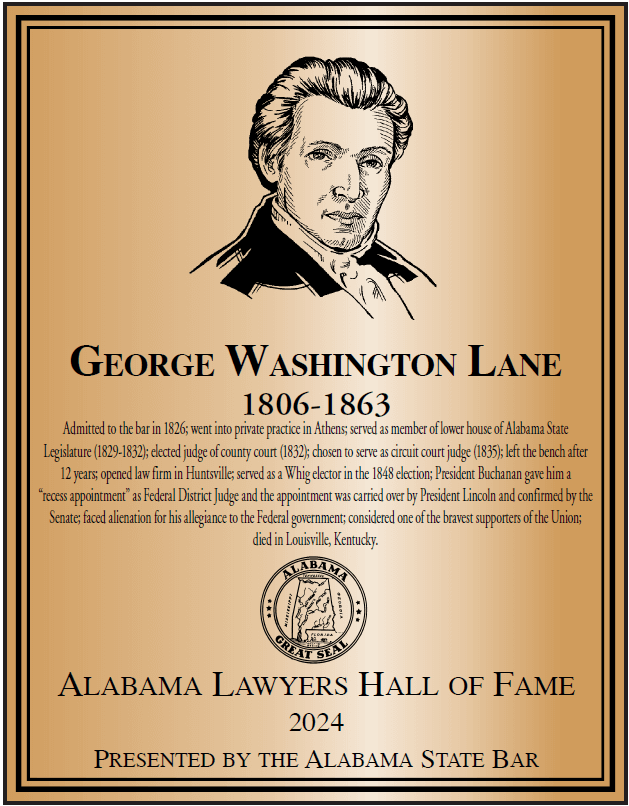
George Washington Lane was born in Cherokee County, Georgia in 1806. In 1821 he moved with his parents to Alabama and the family settled in Limestone County. He received only an elementary education but he read law under Athens, Alabama Judge Daniel Coleman and was admitted to the Bar in 1826. He went into private practice in Athens. Lane served as a member of the lower house of the Alabama State Legislature from 1829-1832. In 1832 he was elected judge of the county court. Then in 1835 he was chosen to serve as a circuit court judge where he continued in office for twelve years. After leaving the bench he moved to Huntsville and opened a law office there where he practiced until 1861. In the Presidential election of 1848, he served as a Whig elector for Zachary Taylor.
The 1840 census indicated that Lane owned 44 enslaved persons. When he moved to Huntsville, he did something very unpopular for that era in Alabama history. He set all of his slaves free. Lane was very much against secession, was a strong Unionist, and he became what was known as a “cooperationist”, seeking to keep the country together.
On January 12, 1861, one day after Alabama announced secession, Judge William Giles Jones resigned as Federal District Judge for Alabama. President Buchanan gave Lane a “recess appointment” to fill that position. This was carried over by President Lincoln after his March inauguration. The appointment was confirmed by the Senate two days later and Lane received his commission on the same day. Lane’s duties, however, were severely hampered by the fact that Alabama, as a secessionist state, did not recognize Lane’s authority.
To make matters worse, an angry mob demanded that he resign the appointment. In response, Lane nailed a Union flag on the roof of his home and swore that it would be torn down only over his dead body. Today, the residents of his house, located at 511 Adams Street in Huntsville, still fly the American flag from the front porch in honor of Judge Lane.
Judge Lane had maintained his allegiance to the Federal government throughout the secession movement in Alabama. Similarly to his estrangement from his neighbors in Limestone County after the manumission of his slaves, he was alienated from his fellow citizens of Huntsville due to carrying out his appointed duties. One of his duties was to determine how much food was kept in area smokehouses in order to help feed the Union Army which occupied Huntsville beginning in April, 1862. He was also tasked with approving passes for civilians to go from one location to another. With his knowledge of which families were pro-Union and which could not be trusted, he had the final say of the locals’ travels. And he advised the military that civilians who assisted Confederate forces in inflicting guerrilla damages on Union troops be transferred to northern prisons.
As the occupation of Huntsville by Union forces came and went, so did the Lane family, for their own safety. They fled the city twice when their lives were threatened. During the second evacuation, they lived at the Galt House in Louisville, Kentucky, waiting for the political climate to improve before returning to Alabama. It was there that Judge Lane died on November 12, 1863. The Louisville newspaper, when reporting his death, said that Judge Lane found it impossible to “exercise his judicial functions” in Huntsville.
George Washington Lane is buried in Louisville, Kentucky, but his family eventually returned to Huntsville. One of his daughters married a Union veteran. Two of his sons joined the Confederate Army, and one, Captain Robert W. Lane of Forrest’s cavalry, died in service as a result of exposure.
George Washington Lane is considered to be one of the bravest supporters the Union ever had. Despite the anger, accusations, and resentment of his fellow Alabamians, a noted historian of the Civil War and Reconstruction Era in Alabama history, Walter L. Fleming, gave this positive assessment of Lane’s life when he wrote: “Of the men of position and influence who were found in the ranks of opposition to the Confederate government after 1861, Judge Lane is the only one whose course can command respect. He was faithful to the Union from first to last, while the others were erratic persons who changed sides because of personal spites and disappointments.” George Washington Lane is now recognized for his political courage at a difficult time in history by his induction into the Alabama Lawyers Hall of Fame.
- Alex W. Newton (1930-2015)
-
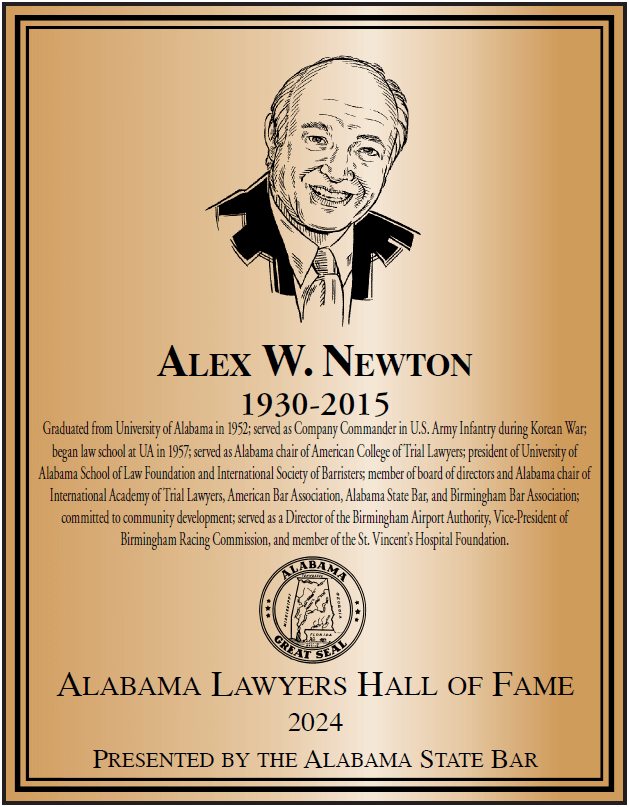
Alexander Worthy Newton was born in Birmingham, Alabama on June 19, 1930. His parents were Jeff and Annis Newton. His leadership qualities were demonstrated early in his life as Alex became an Eagle Scout. When he graduated from Phillips High School in 1948, Alex attended the University of Alabama from which he graduated in 1952. He then served as a Company Commander in the United States Army Infantry during the Korean War. At the time of his discharge from the Army, he had attained the rank of Captain.
After his Army service, Alex began law school at the University of Alabama. In 1957 he began his law practice at the Birmingham firm of Hare, Wynn & Newell which, shortly thereafter became Hare, Wynn, Newell & Newton. He quickly built a reputation for himself as a dedicated and talented attorney, representing plaintiffs in jury trials. At one time, he had more million-dollar jury verdicts for plaintiffs than any other lawyer in Alabama.
Several of his cases ended in notable settlements. Early in his career, when The Saturday Evening Post magazine accused Alabama Coach Paul “Bear” Bryant of encouraging violence in his players and of conspiring to “fix” the outcome of the 1962 Alabama-Georgia game, he represented Coach Bryant in his libel suit against the magazine. When it was discovered that the allegations were based on false and fabricated evidence, the Post offered Coach Bryant an out of court settlement. Mr. Newton also represented the family of Davey Allison in their lawsuit against McDonnell Douglas Aircraft Company. After conducting extensive flight testing, it was confirmed that the accident was caused by failure of the aircraft. McDonnell Douglas quickly settled the case.
Mr. Newton was devoted to the advancement and integrity of the legal profession. He served as the Alabama chair of the American College of Trial Lawyers, a member of the board of directors and Alabama chair of the International Academy of Trial Lawyers, president of the University of Alabama School of Law Foundation, president of the International Society of Barristers, and for seven years served as a member of the Jefferson County Judicial Nominating Committee. He was a member of the American Bar Association, the Alabama State Bar, and the Birmingham Bar Association. He served on several committees of both the state and local bar associations.
While serving on the Birmingham Bar Association Executive Committee, Mr. Newton was instrumental in nominating and electing the first African American member of the Executive Committee, who later became the first African American president of the Birmingham Bar Association. Also, while a member of the Jefferson County Judicial Nominating Committee, he secured the nomination of Birmingham’s first African American circuit court judge.
Mr. Newton received several honors for his commitment to the profession. In 1982 he received the Sam W. Pipes Distinguished Alumnus Award from the University of Alabama School of Law. In 1984, the University of Alabama’s Farrah Law Society named him Outstanding Alumnus for that year. And he was chosen as the 2007 Birmingham Bar Association’s Lawyer of the Year.
Alex Newton was equally committed to community development and civic causes. He was a member of the Leadership Alabama Class IV, and a founding member of the Board of Directors of First Commercial Bank, currently Synovus Bank. He was a member of Independent Presbyterian Church, the American Legion, and spent more than 50 years as a member of the Monday Morning Quarterback Club. Mr. Newton served as a director of the Birmingham Airport Authority, Vice-President of the Birmingham Racing Commission, and was a board member of the St. Vincent’s Hospital Foundation, the Jefferson County Health Care Authority, and the Alabama Trust Fund. Finally, Alex had been a member of the Sigma Chi fraternity at the University of Alabama. In 2014 he received Sigma Chi International’s Significant Sig Award, the organization’s highest honor.
Alex Newton was respected by all who knew him and was deeply loved by his friends and family. His significant contributions to the legal profession and to his community were overwhelming and are felt to this day. He was an extraordinary man. The Alabama State Bar proudly acknowledges him as a member of its Lawyers Hall of Fame.
- Louis Charles Wright (1922-2001)
-

Louis Charles Wright was born in Etowah County, Alabama on May 14, 1922, the youngest son of Louis Clifford and Elizabeth (McBrayer) Wright. He attended the public schools of Etowah County and was a graduate of the Etowah County High School. He next attended and graduated in 1943 from the Alabama Polytechnic Institute, now Auburn University. In September of 1943, Wright entered the United States Naval Officer Training School at Northwestern University in Chicago, Illinois from which he was commissioned as an Ensign in the United States Naval Reserve. Upon being commissioned, in December 1943, Ensign Wright was assigned as the Communications Officer on the LCI(L)-402, an Infantry Landing Craft, which was serving in the Pacific Theater in World War II. In 1944, Ensign Wright, age 22 years, was named the commanding officer of the USS LCI(FF)-572, also an Infantry Landing Craft, with a complement of 4 officers and 24 enlisted men. He commanded this ship, which saw action in the South Pacific and in the liberation of the Philippine Islands, until the War ended in 1945. Wright retired from the Naval Reserve at the rank of Commander in 1967 having competed 23 years of service.
In March of 1946, Wright entered the University of Alabama School of Law from which he graduated in 1949 and was a member of the Farrah Law Society. Because he graduated from the state law school, Wright was automatically licensed to practice law in Alabama. He returned to his native Etowah County and began his law practice in Gadsden, Alabama. In 1955, Wright ran for and was elected as the Circuit Solicitor of the 16th Judicial Circuit which consisted of Etowah County. As a Circuit Solicitor, Wright said that he, “personally investigated all homicides and worked up my own cases. One case I was involved in was written up in True Detective.” Wright served two terms as Solicitor and then returned to the practice of law, ultimately becoming a partner in the firm of Dortch, Allen, Wright and Wright where he practiced from 1965 until 1969. Wright was elected as a State Representative from Etowah County and served from 1967 to 1969 in the Alabama Legislature.
On September 12, 1969, the Alabama Legislature passed Act No. 987 abolishing the Court of Appeals and creating two new intermediate appellate courts: the Court of Criminal Appeals and the Court of Civil Appeals. In November of 1969, Governor Albert Brewer appointed State Representative Wright as one of the three judges on the new Court of Civil Appeals. Judge Wright maintained his seat on the Court of Civil Appeals from 1969 until his retirement in January of 1987. During this time, he served as Presiding Judge for more than 15 years. Immediately after retirement as an active judge, he took active retired status and remained a participant in the proceedings of the Court of Civil Appeals until 1999. As an active and an active retired judge, Judge Wright served for 30 years as a member of that court. In his 30 years of service to the Court of Civil Appeals, Judge Wright authored 1,966 opinions, more than any other judge on the Court. From 1973 until his retirement in 1987, Judge Wright also served by appointment of the Alabama Supreme Court as the Chief Judge of the Court of the Judiciary. Additionally, he was called upon twice to serve as a Special Judge with the Supreme Court of Alabama.
Judge Wright was athletic and enjoyed playing golf and gardening. He admitted to never taking a vacation believing that “he had such a responsibility to the parties in the suit” that he couldn’t take a vacation. He also stated that, “Most people just don’t realize what a mental exercise it is to sit at a desk and put your opinions on paper hour after hour, day after day. – you get mentally weary. It’s actually more tiring than physical labor.” Judge Wright served as President of the Etowah County Bar Association, was a member of the Alabama Law Institute, and the American Bar Association.
Judge Wright died on November 27, 2001, in Montgomery. He loved the law and the judicial system to which he dedicated his professional career.